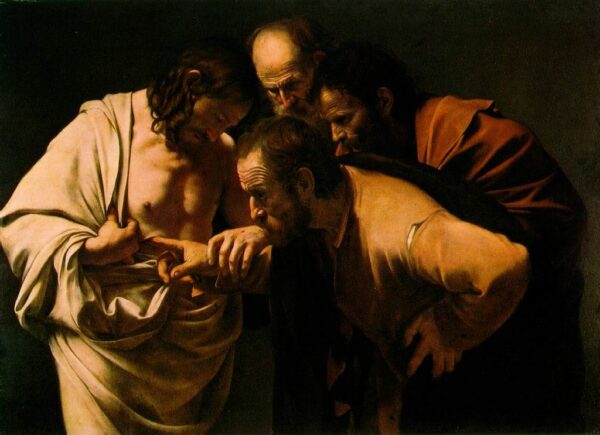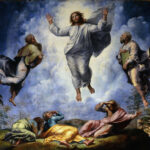Second Sunday of Easter (or Sunday of Divine Mercy, Year A)

“Put your finger here and see my hands,
and bring your hand and put it into my side,
and do not be unbelieving, but believe.”
Thomas answered and said to him, “My Lord and my God!”.
If you cut the quotation here you get a different impression, right? I mean: compared to when all the attention of the sermons and meditations on the text falls on Thomas and his “need to put his finger into the nailmarks to check”.
I wanted to highlight this passage which in my opinion represents kryptonite for Jehovah’s Witnesses (keep in mind they deny the divinity of Jesus): St. Thomas calls Jesus Christ “God”, and Jesus isn’t certainly correcting or rebuking him for that, on the contrary!
Over the years I have had many opportunities to debate with the JW, but that one time, at home, when I presented this passage to the usual two guys and pressed them a bit, they suddenly remembered that they were late for some other appointment (they really had to go) and they disappeared, never to return again. Nobody from the group in fact ever showed up again, even after several years. Evidently they must have put a note for their colleagues in preaching: my home address was to be avoided.
Don’t get me wrong: it’s not that I have delusions about my ability to correctly interpret Scripture, especially considering that I don’t know Greek. But I do have some edge over skeptics or followers of new religions, however erudite. I’m defending tradition!
That is, the interpretation of the text that comes to us through a chain of deeply motivated people (often paying with their lives for their testimony) from apostolic times: when there could be no equivocation with the language, and crucially with the fine details of word usage that change from place to place and from time to time. Above all they lived through the lives, they breathed the thoughts of people very close to Jesus, the Apostles, the Evangelists.
We’re speaking of an entire community that was convinced of clearly defined ideas such as the divinity of Jesus.
When Thomas calls his Master “Lord” (Kyrios) and “God” (Theos), the nascent Church understands those words exactly as we do.
And yet some critics pretend to say that those early Christians were all wrong: it was just a colossal misunderstanding, and only after centuries smart, enlightened readers finally came, explaining to us all the real meaning of words! Oh, they now tell us, those words can bear a different meaning!
First of all such a disastrous misunderstanding would be inadmissible even from the point of view of an atheist, who after all can concur on basic aspects of human thought processes and agree on the implausibility of certain fantastic interpretations. But it’s even worse: many of the critics are also believers in (some version of) God. Therefore in their mind not only such a blunder somehow prevailed, with the masses worshiping as God a mere man (a prophet?). But such mistake would have spread around the world, and prevailed, despite the omnipotence of God! Hence you’re stuck with two possibilities: either a basically evil God, a sort of prankster, who enjoys deceiving us into believing absurd ideas, or a weak, powerless God, who’d love to send a clear message to us, but falls victim (!) of a series of misunderstandings. Let’s not kid ourself, both are ridiculous even to suggest.
(And yet Muslims are stuck in one of those untenable scenarios: Jesus for them is certeinly not God, but God is the greatest deceiver and has caused Christians to be led, in good faith, to worship Jesus as a god, so they’re guilty of the worst act of blasphemy).
Let’s get back to the basics: words and their meaning
Kyrios means Lord, and can be a designation meant as a sign of respect, as it is for us: not just a term associated with God. But the text of the Gospels is written in Greek, the same language used for the Septuagint. The Septuagint was the authoritative version of the Old Testament books for Jews who lived across the Hellenistic world and often spoke very little Hebrew. It is also the OT reference text for early Christians and NT authors. And in the Septuagint Kyrios is used to indicate God, replacing the Name of God, the sacred tetragrammaton (which we approximate in our alphabet as YHWH, and that had to be pronounced something like Yahweh) that a pious Jew could never read aloud. In fact, when the Jews read, they used the term Adonai instead, which again can be properly translated as Lord, every time they encountered those 4 letters that indicated the God of Israel. So Kyrios corresponds quite well to the Hebrew term that was typically used for God the Only God, the Creator.
But in many parts of the NT, Kyrios is used, and profusely, to refer to Jesus!
The critic may retort: but this Kyrios originally represented a different term. You may consider reading into it a title like “Master” or even “Rabbi”.
Oh come on! Who’d be so insane to expose himself so recklessly to such a catastrophic misunderstanding? Putting the reader in a position to confuse a simple prophet, a founder, a human being, even if wise and a religious guide, with God himself?
We’re not dealing with language trivia and obscure customs here. This is about authors who needed to use a commonly understood, international language (as English is today) that was not their own native language; they needed to render an Aramaic or Hebrew original word correctly, in order to be understood well. They had significant freedom of action: they were building their own specific vocabulary on the spot! How could they possibly come up with the insanity of using the very same word to indicate their master and the Creator of the Universe?
Notice: it just so happens that God wanted this type of identification, which some critics today consider abusive, to take place in an environment, the Jewish land, where people were even excessively careful not to disrespect the name of God, with a reverence bordering on superstition. If there is a people who could not accept a confusion between God and man, it was precisely the one in which Jesus was born!
No, this is as clear as day; this juxtaposition, this choice of words, cannot be casual or reckless. There is a vision, a conviction, a desire to recognize both a divine and a human nature in Jesus; concepts that don’t simply appear out of the blue from later theologies. They have no qualms about putting Jesus alongside God just as the Jewish leaders had no qualms about wanting to crucify him for the very same reason!
Be wary of those who want to convince you it’s all a misunderstanding, because sooner or later they will literally tell you that Jesus Christ died of !
There are some who play games even with the second term used, Theos to mean God, because the word itself wasn’t exclusively used to indicate God, strictly speaking.
In the Bible this word or its Hebrew equivalent Elohim appears, beyond referring to Yahweh God, to indicate the (false) pagan gods, or even, in rare cases, to refer to people who, like Moses, in a particular situation are thus called (directly by God!) as they are his representatives, who carry his word and act on his behalf.
Can you appreciate how there’s always an opening for those who don’t want to believe? “Even a simple envoy, a representative of God, could be called God”, they will tell you. But that’s a desperate move, which an objective person cannot swallow: the context is completely different.
One thing is God telling men entrusted with the office of judges: “You are (as) gods” , and the as I added within parentheses isn’t abusive, because there’s a metaphor here: God tells them that through their power to judge they are His representatives, they are taking the position of God himself; but then He proceeds to criticize them for being unworthy of their role.
Quite another thing is the disciple who calls his master God through fear and wonder, facing concrete proof he’s Lord of life and death!
For greater confirmation, the (Italian language) link posted above reports a fact that I did not know: in Exodus 21, 6, the original Hebrew text uses “Gods” to indicate the judges, but the Septuagint already corrected that, in order not to create confusion in the understanding of the text for people who lived closer to the time of Jesus; so the Septuagint has “the court of God” in its place.
In other words here we have a tangible confirmation that even the literary style had changed, and no one dreamed of using such a compromising word, one that is easily misunderstood, to refer to something other than God. Once again: the whole edifice is founded on subtleties; but once these subtleties have been thoroughly analyzed, the result is much more solid and reliable than before.
Such topics can’t become a sort of Hunting Reserve for exegetes.
I think now one could appreciate my concern; what motivates me is the need to have an understanding, trying to put my finger on these issues even as a non-expert: it seems clear to me in fact that scholars in many cases are deeply biased and focus on a subject ignoring the logical connections, the global context, the multidisciplinary reasons. There’s almost an aura of sacrality around the figure of the expert, against whom (according to the prevailing idea in the media) no objection could be made on principle, since people like me don’t possess equivalent qualifications. But many experts often end up not wanting to look beyond their nose. Say: the plausibility of a translation is being discussed? Then the topic is language and textual criticism; on a good day there will be a discussion of the typical cultural context. Breaking up a few sentences and torturing them until they confess whatever you want. Forgetting about what forces move people deep down, what was the precise historical context, what crucial constraints are involved in the claims of an alleged divine revelation.
No, we cannot live on this planet without delving deeper and questioning assertions.
We must try to get an idea of what the truth is, drawing heavily on wisdom and relying on the most solid knowledge possible.
In fact, if we don’t do this and we delegate, there will be scholars, rich in knowledge but usually not in wisdom, who will have the power to define our reality. And they will abuse that power. And they’ll follow ideologies and fads: they won’t be guarantors of anything except their own jealous respectability.
Summing it up:
Thomas, who was incredulous at first, meets his rabbi who demonstrates that he has defeated death, that he is the master of life. He’s in awe, overwhelmed: he immediately reacts with an exclamation. He calls him Lord and God, putting together, thus reinforcing them, two terms referable to the Divinity; yet he believes in a jealous God, rigidly framed in monotheism.
This is one of the first manifestations of a new faith, which due to its roots CANNOT take a statement about divinity lightly, yet for Jesus it affirms it!
And it’s from here that a story unfolds, in contunuity, for centuries: a community united by believing in a series of dogmas, i.e. difficult concepts, which do not arise from a philosophy, but from trying to make sense of a set of events that are otherwise difficult to decipher. Which, for example, seem to purposefully describe Jesus as a man, and at the same time to affirm his divine nature. Both placing him side by side with the Father and continuing to affirm the oneness of God.
This story is complicated because, according to us Christians, we’ve discovered that God’s nature is complicated in and of itself!
And that’s why, in order to force us to adapt our thinking to an elusive reality, carefully avoiding our framing him through our misguided thoughts and expectations, Christ could only present himself this way: letting his revelation percolate little by little, creating the finest balance without rushing it or overemphasizing a facet. Initially preventing his followers from spreading the news that he was the Christ (the prophesied Messiah), for example. This is a subtle play because it’s necessary to prevent any distortion: otherwise some would fall into polytheism and superstitions, some would not be able to distinguish him from the Father; some would take him for a mere man, plain and simple; some would see in him a divine apparition, whose humanity was only apparent. And so on.
This is one of the reasons why Jesus bewilders his own so often: he must slowly educate them to see things as they are, instead of as they imagine them. Changing their mentality, also from a cognitive point of view. Only this way they become able to seek an explanation of what they have seen and received, instead of projecting their own philosophical vision onto him.
And so here we can appreciate why there were and there are heresies, present almost from the beginning: those who take their prejudices and ideas as the indisputable starting point, did not accept the reality testified by witnesses but wanted to bend it to their own ideology. They then came to affirm a different Jesus, one who could be tamed and made a champion of their cause.
Bearing witness to our faith in an Islamized world
Some may object: why waste time insisting on the divinity of Christ? Isn’t this a fact, widely accepted except by relatively few fringe groups? Yes, there are groups like Jehovah’s Witnesses and Mormons, plus a plethora of demystifiers and of “Christians in their own personal way”, but they don’t carry all that weight, they’re small minorities… The Protestant world believes in the divinity of Christ, and consider “out” those who don’t.
And yet, think about it: the most numerous and growing religious group is that of Muslims, who believe precisely in this incongruous and unsustainable vision of a blatantly misunderstood prophet Jesus. And they affirm this with rock-solid certainty, while disagreement isn’t even allowed.
Although the confrontation with Islam in the near future will play on a different level (demography, willpower, strength, power struggles…) certainly preaching has and will carry some significant weight; the naïve and arrogant Islamic testimony, the dawa, on one side; the complex and profound Christian apologetics, on the other.
On paper there is no match.
But how many of our superficial Christians, vaguely attached to their religious roots out of habit, will be able or willing to defend “their” faith?
It’s not so easy to stand up to the Muslim colleague or neighbor who uses one of those pre-packaged arguments to put you on the spot:
Show me a passage in the Bible where Jesus says “I am God, worship me!”
A couple of well-placed quotes, and millions of Christians will face a deep crisis for their faith. Many will in fact abandon it on occasion of this kind of test!
And this will be our fault too. All of us. Wasting away decades through vaguely sentimental homilies exhorting people to a generic “striving to be good” and prayers of the faithful such as: “For our rulers, make them understand how they should work for the common good by promulgating laws that promote peace, harmony and social justice, hear us O Lord!”
No, the most useful initiative for our faith, today, would be to ask priests to retrain themselves more thoroughly on the fundamentals, then become permanent trainers: to give their parishioners a solid knowledge, or at least a smattering. So that one day those pew-sitters may not feel lost like ignorant fools, with their mouths agape, once confronted with a hard question!
We must prepare ourselves.
Knowing how to explain that it makes no sense to dictate the terms and conditions for the text of the Gospels, based on our limited, human preconceptions: Jesus did not directly say “It’s me, God, now worship me” because that would have encouraged a series of misunderstandings, as well as precipitating the situation prematurely, without having the time to prepare the ground. It would have caused a turn towards paganism, in the eyes of most, detaching the community from its fundamental Jewish roots.
It would have made it almost impossible to also see a human being in Him.
I said it before: it’s a game of subtleties. That question about Jesus, who “should have” blurted out an “unequivocal” sentence demanding to be worshiped immediately, as is nowadays claimed by Muslims, is equivalent to a student who asks: “In short, Nature must give me a clear signal, a photon is a wave, right? Or is a photon a particle?” (I will come back to this parallel in the future.)
Muslim must be made aware: the NT is pervaded by references, more or less visible -at least at first glance- to the divinity of Christ. In the words that are carefully chosen; in the unique, divine prerogatives of Jesus. Additionally, sometimes the testimony comes from others; this carries even more weight for this very reason. And this episode with St. Thomas is one of them.










































